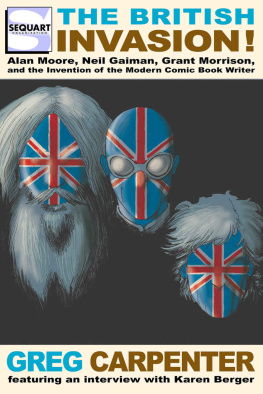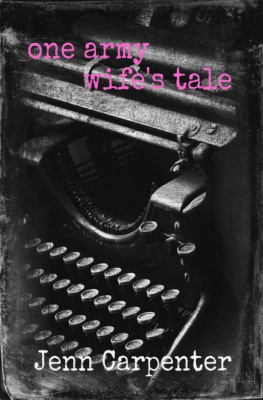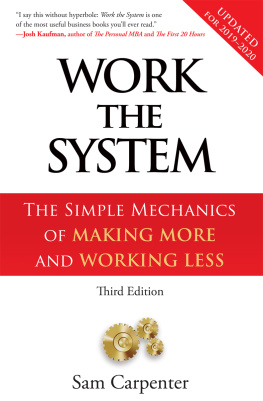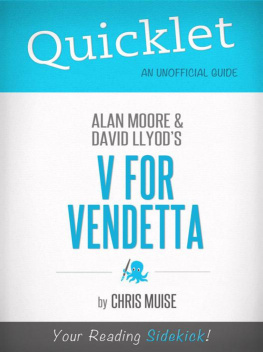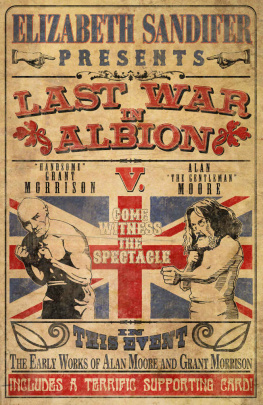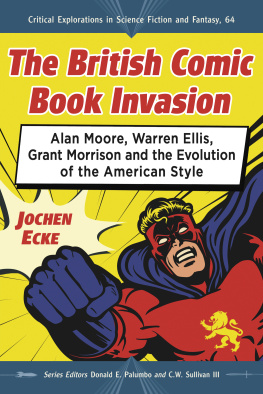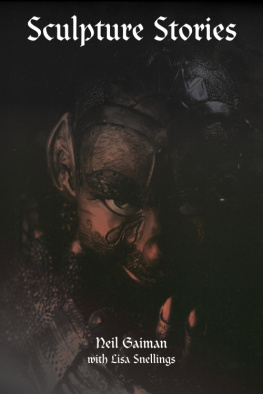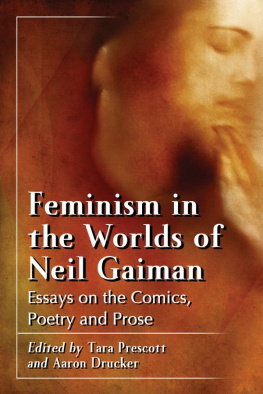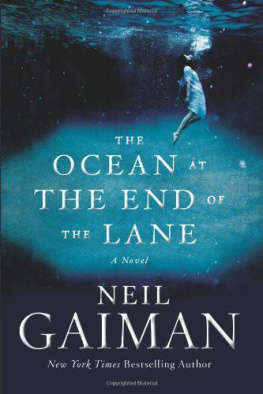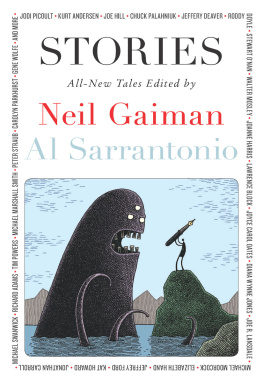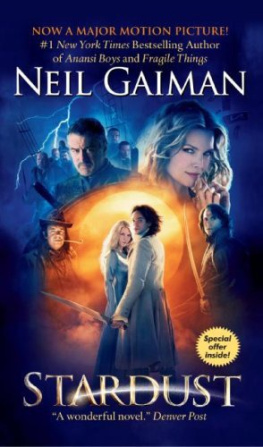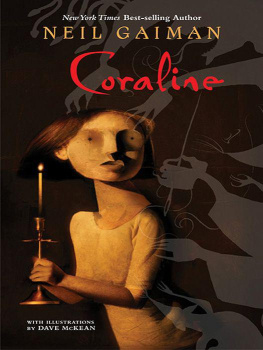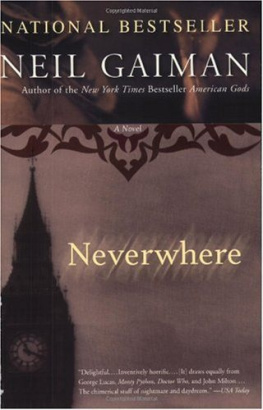Carpenter - The British Invasion: Alan Moore, Neil Gaiman, Grant Morrison, and the Invention of the Modern Comic Book Writer
Here you can read online Carpenter - The British Invasion: Alan Moore, Neil Gaiman, Grant Morrison, and the Invention of the Modern Comic Book Writer full text of the book (entire story) in english for free. Download pdf and epub, get meaning, cover and reviews about this ebook. year: 2016, publisher: Sequart Organization, genre: Detective and thriller. Description of the work, (preface) as well as reviews are available. Best literature library LitArk.com created for fans of good reading and offers a wide selection of genres:
Romance novel
Science fiction
Adventure
Detective
Science
History
Home and family
Prose
Art
Politics
Computer
Non-fiction
Religion
Business
Children
Humor
Choose a favorite category and find really read worthwhile books. Enjoy immersion in the world of imagination, feel the emotions of the characters or learn something new for yourself, make an fascinating discovery.
- Book:The British Invasion: Alan Moore, Neil Gaiman, Grant Morrison, and the Invention of the Modern Comic Book Writer
- Author:
- Publisher:Sequart Organization
- Genre:
- Year:2016
- Rating:5 / 5
- Favourites:Add to favourites
- Your mark:
- 100
- 1
- 2
- 3
- 4
- 5
The British Invasion: Alan Moore, Neil Gaiman, Grant Morrison, and the Invention of the Modern Comic Book Writer: summary, description and annotation
We offer to read an annotation, description, summary or preface (depends on what the author of the book "The British Invasion: Alan Moore, Neil Gaiman, Grant Morrison, and the Invention of the Modern Comic Book Writer" wrote himself). If you haven't found the necessary information about the book — write in the comments, we will try to find it.
The British Invasion: Alan Moore, Neil Gaiman, Grant Morrison, and the Invention of the Modern Comic Book Writer — read online for free the complete book (whole text) full work
Below is the text of the book, divided by pages. System saving the place of the last page read, allows you to conveniently read the book "The British Invasion: Alan Moore, Neil Gaiman, Grant Morrison, and the Invention of the Modern Comic Book Writer" online for free, without having to search again every time where you left off. Put a bookmark, and you can go to the page where you finished reading at any time.
Font size:
Interval:
Bookmark:
Greg Carpenter

Sequart Organization (Edwardsville, Illinois)
Copyright 2016 by Greg Carpenter. Characters and works mentioned herein are trademarked by their respective owners.
Kindle edition, August 2016.
All rights reserved. Except for brief excerpts used for review or scholarly purposes, no part of this book may be reproduced in any manner whatsoever, including electronic, without express consent of the publisher.
Cover by Kevin Colden. Book design by Julian Darius. Interior art is their respective owners.
Published by Sequart Organization. Edited by Glen Downey.
For information about other titles in this series, visit sequart.org/books .
Dedication
For Dana,
who showed me what a hero really looks like;
and for my children,
L and J,
who never made me feel guilty for neglecting them.
Well, almost never.
Contents
A few years ago, The New Yorker featured a cartoon by Bruce Eric Kaplan that addressed the changing status of comics in Western Culture. As two pretentious characters walk past a bookstore, one of them grumbles, Now I have to start pretending I like graphic novels too? As an indicator of the current status of comics as a medium, Kaplans cartoon says more than any ten academic books or one hundred journalistic think pieces ever could. While it might be easy to tune out a die-hard comics fan, screaming about the greatness of comics like some Depression-era newsboy, its much harder to ignore the fact that pretentious posers and pseudo-intellectuals are now having to fake an interest in comics simply to keep up. As the cartoon indicates, the comics medium hasnt simply arrived; its the new broccoli.
Such was not always the case. When I was in second grade, my family lost all our possessions in a house fire. My teacher, Miss Della, a kind but rigid, blue-haired grammarian who still believed in whacking a students knuckles or yanking a lock of hair when needed, asked the class to donate clothes and toys. On my first day back, she presented me with the box of donations in front of the class, examining each item one at a time. Among the goodies were two copies of The Fantastic Four . Holding them in her hand, she paused as if unsure of what to do next, before finally announcing with the icy disdain of a 17 th -century Puritan, Im going to leave these in here right now, since they were donated, but knowing the kind of person you are, Im sure youll do the right thing and throw them away. One thing about Miss Dellashe knew trash when she saw it.
While there will always be a few Fredric Wertham disciples who havent heard that the war is over, most of that comics-burning zealotry died out long ago. But what replaced it, while less vitriolic, was perhaps even more damaging. In order to appease critics like Wertham and to ward off any Draconian actions by the United States Congress, the comics industry embraced a set of self-imposed restrictions that branded comics as juvenile entertainment, relegating it to a cultural ghetto for many years.
Throughout the 60s, 70s, and early 80s, the corporations that published the most popular mainstream comics licensed their characters for toys, clothes, and poorly animated cartoon series, so the names and images of many of the characters were instantly recognizable, but the comics themselves existed almost entirely within a sub-culture on the margins of society, carefully curated by the likes of Comic Book Guy on The Simpsons . Want to know which issue of Radioactive Man featured an evil twin clone from a parallel dimension that travelled through time in order to save the Earth from a Martian invasion? Just ask Comic Book Guy.
But times change. The 21 st century has seen comics move from Androids Dungeon and Baseball Card Shop to the Broadway stage and the Metropolitan Museum of Art. Today, San Diego Comic-Con, once primarily a comic book convention laughably christened nerd prom by Warren Ellis, has become one of the most influential pop culture gatherings in the world, rivaling even the Cannes Film Festival for celebrities and Hollywood hype. Acclaimed filmmakers like Ang Lee and Christopher Nolan have directed superhero movies, while Bono and the Edge have written songs for Spider-Man. A few years ago, comic book historians used to boast, without irony, that even Mickey Spillane once wrote comic books. Today, celebrated novelists like Michael Chabon, Jonathan Lethem, Stephen King, Brad Meltzer, Joe Hill, and Jodi Picoult have all written comics. And if the comics medium had its own trophy case, it would house a Pulitzer Prize, an American Book Award, and an Oscar. Its enough to make ol Miss Della pull her blue hair out.
All of which begs the question, Why now? In a jargon-heavy essay from PMLA , the premier academic journal for literary studies, Marianne Hirsch offers an explanation. She suggests that comics provide a showcase for the use of biocularityessentially the idea of processing two things simultaneously. Leave it to the academic community to prop up a six-syllable word in order to explain that comics use both words and pictures. Hirsch argues that comics are becoming more relevant today because they provide better training for people who must process multiple forms of information simultaneously. While her essay focuses primarily on the relationship between reading comics and interpreting political events, the central irony is that what was once considered a sign of the unsophisticatedreading books with picturesnow looks like useful conditioning for readers in the 21st century. Comics arent just respectable; theyre essential.
Thats one theory. But if you continue to ask why comics are enjoying such broad exposure today, youll hear a noisy cacophony of competing ideas. I like to imagine all these cultural theorists gathered around a large oval tablejust like the Justice League of America.
At the far side of the table sits the Middle-Aged Comics Critic with twenty years worth of back issues of The Comics Journal . He (and make no mistake, this particular critic is a he) believes passionately that comics is an art form worthy of praise, but he has hated every mainstream genre comic published since the day he turned 21. His voice is raspy; his mode, rant: Im telling you, every single one of these Marvel and DC hacks selling their soul to Hollywood today ought to bow down and lick the boots of Robert Crumb, Harvey Pekar, and the whole underground comix scene. If it werent for those guys, nobody would care about comic books. All these new guys are just cashing in on the hard work of the real artists .
Sitting next to the critic we see a far less angry but equally single-minded Market Analyst, clutching the mornings Wall Street Journal with one hand and a Blackberry in the other. His voice sounds constricted, perhaps affected by his excessively tight, unironic bowtie, as he interrupts the critics rant: With all due respect, if we take out the emotion and just look at the numbers, well see that this current trend is simply a result of the distribution advantages that came from the transition to the direct market. Product reliability and targeted advertising created a bullish phase, and even though that particular bubble eventually burst, those initial consumers now represent a purchasing block with greater buying power and the market is rising to meet their demand.
Sitting next to the accountant is the Public Relations Specialist, trying to look casual while carefully sipping a Starbucks latte, taking great pains not to spill anything on the Dolce & Gabbana: The secret is always in the packaging. They improved the quality of the paper stock and added computerized coloring. That makes this stuff seem NOW. You cant sell newsprint anymore. It looks like Little Orphan Annie . I mean, I like a good musical, same as the next person, but if you want the sun to come up on your product tomorrow, youve gotta make it look like tomorrow.
Font size:
Interval:
Bookmark:
Similar books «The British Invasion: Alan Moore, Neil Gaiman, Grant Morrison, and the Invention of the Modern Comic Book Writer»
Look at similar books to The British Invasion: Alan Moore, Neil Gaiman, Grant Morrison, and the Invention of the Modern Comic Book Writer. We have selected literature similar in name and meaning in the hope of providing readers with more options to find new, interesting, not yet read works.
Discussion, reviews of the book The British Invasion: Alan Moore, Neil Gaiman, Grant Morrison, and the Invention of the Modern Comic Book Writer and just readers' own opinions. Leave your comments, write what you think about the work, its meaning or the main characters. Specify what exactly you liked and what you didn't like, and why you think so.

